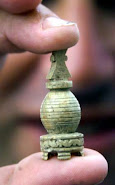This isn't even a blip yet on the West's radar, but it's some serious business. I happened to come across this story this morning while looking at something else - it's nearly a year old, from July, 2010, but certainly relevant:
Nile River row: Could it turn violent?
Jul 7, 2010
Reuters
The giggles started when the seventh journalist in a row said that his question was for Egypt’s water and irrigation minister, Mohamed Nasreddin Allam.
The non-Egyptian media gave him a bit of a hammering at last week’s talks in Addis Ababa for the nine countries that the Nile passes through.
Allam bared his teeth when a Kenyan journalist accused him of hiding behind “colonial-era treaties” giving his country the brunt of the river’s vital waters whether that hurt the poorer upstream countries or not.
“You obviously don’t know enough about this subject to be asking questions about it,” he snapped before later apologising to her with a kiss on the cheek.
Five of the nine Nile countries — Ethiopia, Uganda, Tanzania, Rwanda and Kenya — last month signed a deal to share the water that is a crucial resource for all of them. But Egypt and Sudan, who are entitled to most of the water and can veto upstream dams under a 1929 British-brokered agreement, refused.
The Democratic Republic of the Congo and Burundi have not signed yet either and analysts are divided on whether they will or not. Six Nile countries must sign the agreement for it to have any power but Egypt says even that wouldn’t change its mind. The five signatories — some of the world’s poorest countries — have left the agreement open for debating and possible signing for up to a year.
Tensions were clearly still running high after two days of negotiations in Addis and despite grinning around the table and constantly referring to each other as “my brother”, the ministers always seemed in danger of breaking into bickering.
When the Sudanese water minister said his country was freezing cooperation with the Nile Basin Initiative — the name given to the ten-year effort to agree on how to manage the river — Ethiopia’s water minister loudly protested to the media that his Sudanese colleague had not revealed that during their private meetings.
Highlighting the seriousness of the issue, Egyptian Foreign Minister Ahmed Abul Gheit and International Cooperation Minister Fayza Abul Naga, arrived in Addis Ababaon Wednesday to again meet Ethiopian Prime Minister Meles Zenawi.
It’s no surprise that the spat is getting a lot of press in both Ethiopia and Egypt.
“Egypt is a gift of the Nile,” people like to say in a country that worshipped the river as a God in ancient times. “If Egypt is a gift of the Nile, then the Nile is a gift of Ethiopia,” Ethiopians shoot back with growing confidence.
And they have a point. More than 85 percent of the waters originate in Ethiopia, which relies on foreign aid for survival and sees hydropower dams as a potential cash cow and central to its plans to become one of Africa’s only power exporters.
But Egypt is not for turning. Almost totally dependent on the Nile for its agricultural output (a third of its economy) and already worried about climate change, it is determined to hold onto its 55.5 billion cubic metres of water a year, a seemingly unfair share of the Nile’s total flow of 84 billion cubic metres.
The Egyptians point out that they don’t benefit from rains like the upstream countries. Everybody, it seems, has valid points. Nobody is budging. Now some regional analysts are even saying the row could turn into the world’s first major water war and similar thoughts are being expressed in cafes from Cairo all the way upriver to Dar es Salaam.
So what next? The nine countries are due to meet again in Nairobi sometime between September and November. But where is the way forward? Who will blink first? And who really should? Could this bickering turn violent?
Nile River row: Could it turn violent?
Jul 7, 2010
Reuters
The giggles started when the seventh journalist in a row said that his question was for Egypt’s water and irrigation minister, Mohamed Nasreddin Allam.
The non-Egyptian media gave him a bit of a hammering at last week’s talks in Addis Ababa for the nine countries that the Nile passes through.
Allam bared his teeth when a Kenyan journalist accused him of hiding behind “colonial-era treaties” giving his country the brunt of the river’s vital waters whether that hurt the poorer upstream countries or not.
“You obviously don’t know enough about this subject to be asking questions about it,” he snapped before later apologising to her with a kiss on the cheek.
Five of the nine Nile countries — Ethiopia, Uganda, Tanzania, Rwanda and Kenya — last month signed a deal to share the water that is a crucial resource for all of them. But Egypt and Sudan, who are entitled to most of the water and can veto upstream dams under a 1929 British-brokered agreement, refused.
The Democratic Republic of the Congo and Burundi have not signed yet either and analysts are divided on whether they will or not. Six Nile countries must sign the agreement for it to have any power but Egypt says even that wouldn’t change its mind. The five signatories — some of the world’s poorest countries — have left the agreement open for debating and possible signing for up to a year.
Tensions were clearly still running high after two days of negotiations in Addis and despite grinning around the table and constantly referring to each other as “my brother”, the ministers always seemed in danger of breaking into bickering.
When the Sudanese water minister said his country was freezing cooperation with the Nile Basin Initiative — the name given to the ten-year effort to agree on how to manage the river — Ethiopia’s water minister loudly protested to the media that his Sudanese colleague had not revealed that during their private meetings.
Highlighting the seriousness of the issue, Egyptian Foreign Minister Ahmed Abul Gheit and International Cooperation Minister Fayza Abul Naga, arrived in Addis Ababaon Wednesday to again meet Ethiopian Prime Minister Meles Zenawi.
It’s no surprise that the spat is getting a lot of press in both Ethiopia and Egypt.
“Egypt is a gift of the Nile,” people like to say in a country that worshipped the river as a God in ancient times. “If Egypt is a gift of the Nile, then the Nile is a gift of Ethiopia,” Ethiopians shoot back with growing confidence.
And they have a point. More than 85 percent of the waters originate in Ethiopia, which relies on foreign aid for survival and sees hydropower dams as a potential cash cow and central to its plans to become one of Africa’s only power exporters.
But Egypt is not for turning. Almost totally dependent on the Nile for its agricultural output (a third of its economy) and already worried about climate change, it is determined to hold onto its 55.5 billion cubic metres of water a year, a seemingly unfair share of the Nile’s total flow of 84 billion cubic metres.
The Egyptians point out that they don’t benefit from rains like the upstream countries. Everybody, it seems, has valid points. Nobody is budging. Now some regional analysts are even saying the row could turn into the world’s first major water war and similar thoughts are being expressed in cafes from Cairo all the way upriver to Dar es Salaam.
So what next? The nine countries are due to meet again in Nairobi sometime between September and November. But where is the way forward? Who will blink first? And who really should? Could this bickering turn violent?



































No comments:
Post a Comment